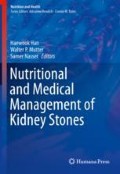Abstract
Incidence of nephrolithiasis is low after kidney transplantation. Kidney stones in transplanted kidney can be of donor origin or newly formed in allograft after transplantation. There are a number of metabolic and mechanical predisposing factors for kidney stone formation in transplant recipients. Diagnosis and management are multimodal and are similar to general population. Nephrolithiasis in kidney transplant recipients can lead to significant morbidity, and outcomes are excellent with timely management.
Access this chapter
Tax calculation will be finalised at checkout
Purchases are for personal use only
Abbreviations
- AKI:
-
Acute kidney injury
- ESRD:
-
End-stage renal disease
- ESWL:
-
Extracorporeal shock wave lithotripsy
- PCNL:
-
Percutaneous nephrolithotomy
- RTA:
-
Renal tubular acidosis
References
Sui W, Lipsky MJ, Matulay JT, Robins DJ, Onyeji IC, James MB, Theofanides MC, Wenske S. Timing and predictors of early urologic and infectious complications after renal transplant: an analysis of a New York Statewide Database. Exp Clin Transplant. 2018;16:665–70.
Rhee BK, Bretan PN, Stoller ML. Urolithiasis in renal and combined pancreas/renal transplant recipients. J Urol. 1999;161(5):1458–62.
Mamarelis G, Vernadakis S, Moris D, Altanis N, Perdikouli M, Stravodimos K, Pappas P, Zavos G. Lithiasis of the renal allograft, a rare urological complication following renal transplantation: a single-center experience of 2045 renal transplantations. Transplant Proc. 2014;46(9):3203–5. Elsevier.
Cassini MF, Cologna AJ, Andrade MF, Lima GJ, Albuquerque UM, Martins AP, Junior ST. Lithiasis in 1,313 kidney transplants: incidence, diagnosis, and management. Transplant Proc. 2012;44(8):2373–5. Elsevier.
Rezaee-Zavareh MS, Ajudani R, Binabaj MR, Heydari F, Einollahi BE. Kidney allograft stone after kidney transplantation and its association with graft survival. Int J Organ Transplant Med. 2015;6(3):114.
Cheungpasitporn W, Thongprayoon C, Mao MA, et al. Incidence of kidney stones in kidney transplant recipients: a systematic review and meta-analysis. World J Transplant. 2016;6(4):790–7.
Verrier C, Bessede T, Hajj P, Aoubid L, Eschwege P, Benoit G. Decrease in and management of urolithiasis after kidney transplantation. J Urol. 2012;187(5):1651–5.
Torrecilla OC, Gonzalez-Satue C, Riera CL, Colom FS, Franco ME, Aguilo LF, Serrallach MN. Incidence and treatment of urinary lithiasis in renal transplantation. Actas Urol Esp. 2001;25(5):357–63.
Kim H, Cheigh JS, Ham HW. Urinary stones following renal transplantation. Korean J Intern Med. 2001;16(2):118.
Challacombe B, Dasgupta P, Tiptaft R, Glass J, Koffman G, Goldsmith D, Khan MS. Multimodal management of urolithiasis in renal transplantation. BJU Int. 2005;96(3):385–9.
Harper JM, Samuell CT, Hallson PC, Wood SM, Mansell MA. Risk factors for calculus formation in patients with renal transplants. BJU Int. 1994;74(2):147–50.
Cicerello E, Merlo F, Mangano M, Cova G, Maccatrozzo L. Urolithiasis in renal transplantation: diagnosis and management. Arch Ital Urol Androl. 2014;86(4):257–60.
Stapenhorst L, Sassen R, Beck B, Laube N, Hesse A, Hoppe B. Hypocitraturia as a risk factor for nephrocalcinosis after kidney transplantation. Pediatr Nephrol. 2005;20(5):652–6.
Venkat Raman G, Sharman VL, et al. Azathioprine and allopurinol: a potentially dangerous combination. J Intern Med. 1990;228(1):69–71.
Author information
Authors and Affiliations
Corresponding author
Editor information
Editors and Affiliations
Rights and permissions
Copyright information
© 2019 Springer Nature Switzerland AG
About this chapter
Cite this chapter
Goyal, N. (2019). Nephrolithiasis in Kidney Transplant. In: Han, H., Mutter, W., Nasser, S. (eds) Nutritional and Medical Management of Kidney Stones. Nutrition and Health. Humana, Cham. https://doi.org/10.1007/978-3-030-15534-6_19
Download citation
DOI: https://doi.org/10.1007/978-3-030-15534-6_19
Published:
Publisher Name: Humana, Cham
Print ISBN: 978-3-030-15533-9
Online ISBN: 978-3-030-15534-6
eBook Packages: MedicineMedicine (R0)

